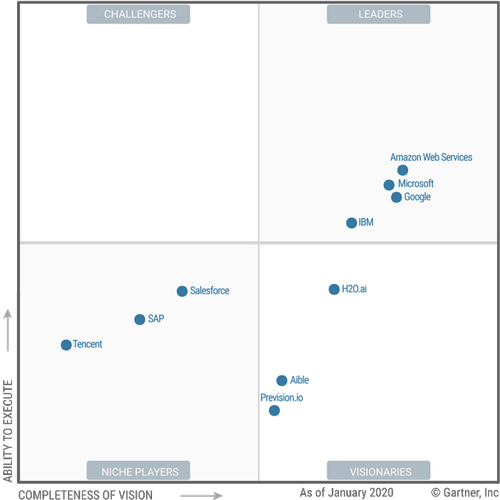News
Study: 'Broad' AI/ML Portfolio Gives AWS Edge Among Devs
Cloud computing's "Big Three" -- Amazon Web Services (AWS), Microsoft and Google -- are the leaders in Gartner's recent study of cloud-based artificial intelligence (AI) developer tools, with AWS earning the highest marks.
The Gartner report, published in late February, is the research firm's "first vendor evaluation specifically around cloud AI/ML environments." It analyzes 10 vendors that offer cloud-hosted AI services aimed at application developers. Gartner focused specifically on vendors that provide services in the areas of automated machine learning, natural language, and visual recognition and analysis.
Of the 10 vendors, the highest-ranked were (in descending order) AWS, Microsoft and Google. Also among the leaders, though in a slightly distant fourth place, was IBM.
Gartner touted AWS' "very broad and capable portfolio" as one of its biggest strengths, alongside its massive market reach (according to recent estimates, AWS owns one-third of the global cloud market).
Gartner also noted that AWS offerings can support the needs of developers across many skill levels, from those with little AI/machine learning experience to those who are more advanced. In recent years, AWS has launched multiple products aimed at democratizing AI and machine learning. It also offers courseware and consulting services for developers and organizations looking for more expert guidance on machine learning projects.
"AWS's offer for developers caters to the needs both of those without ML skills and those seeking advanced functions. Those without ML skills can use pretrained AI services with continuously learning APIs," Gartner said, adding that those looking for "more advanced functions" have the option to use SageMaker, AWS' fuller-featured machine learning platform.
Gartner did caution that AWS' panoply of offerings has the potential to make more work for organizations and developers: "Developers must determine whether AWS's functionality is the best available for their requirements. Application leaders must decide whether they want to consolidate AI projects on a single platform. AWS's breadth can also lead to confusion and governance issues -- for instance, whereas Amazon Lex offers comprehensive translation services, the NLU [natural language understanding] portion of the virtual assistant framework supports only English language intents."
 [Click on image for larger view.] Gartner's "Magic Quadrant" for cloud-based AI vendors (February 2020).
[Click on image for larger view.] Gartner's "Magic Quadrant" for cloud-based AI vendors (February 2020).
Gartner's assessments of the other three leaders, summarized, are as follows:
- Microsoft: AWS' closest competitor benefits greatly from its familiarity to organizations, as well as its recent efforts to infuse AI technologies into more everyday products like Windows and Office 365. It also offers a variety of deployment options for enterprises, from its Azure cloud to on-premises datacenters to virtual private clouds. In addition, according to Gartner, Microsoft has "one of the largest selections of languages for its natural language services," making it attractive to multinationals. Among Microsoft's drawbacks are its "confusing" branding and its lack of direct customer engagement (Microsoft's usual approach, noted Gartner, is to point potential customers to one of its AI partners instead).
- Google: Third-place Google has more extensive language support than the other vendors in Gartner's report. However, its deployment options are currently very limited; for "most" of its AI services, the ability to deploy in an on-premises datacenter or a virtual private cloud is not available (however, Gartner conceded that Google does plan to add these capabilities at some point). More generally, Google suffers from continued "shortcomings in...sales execution and pricing," which has resulted in years of poor market performance compared to AWS and Microsoft. Google's fortunes in AI, Gartner argued, are dependent on the success of the overall Google Cloud Platform.
- IBM: Big Blue's best attributes are its well-regarded research arm (described by Gartner as "a powerful force for leading thinking about AI"), its recent pivot toward hybrid and multicloud, and its 2018 acquisition of Red Hat. Those last two factors, in particular, are attractive to developers seeking more flexibility, Gartner argued. The IBM Watson AI platform is also a favorite among developers for its "relatively painless experience." However, while IBM boasts a wide variety of AI services, its breadth "complicates its task of bringing them all together in a single, coherent and well-integrated environment," according to Gartner.
Gartner provided detailed analyses of the other vendors in its study, which include Salesforce, SAP and Tencent, among others. The full report is available, with registration, here.